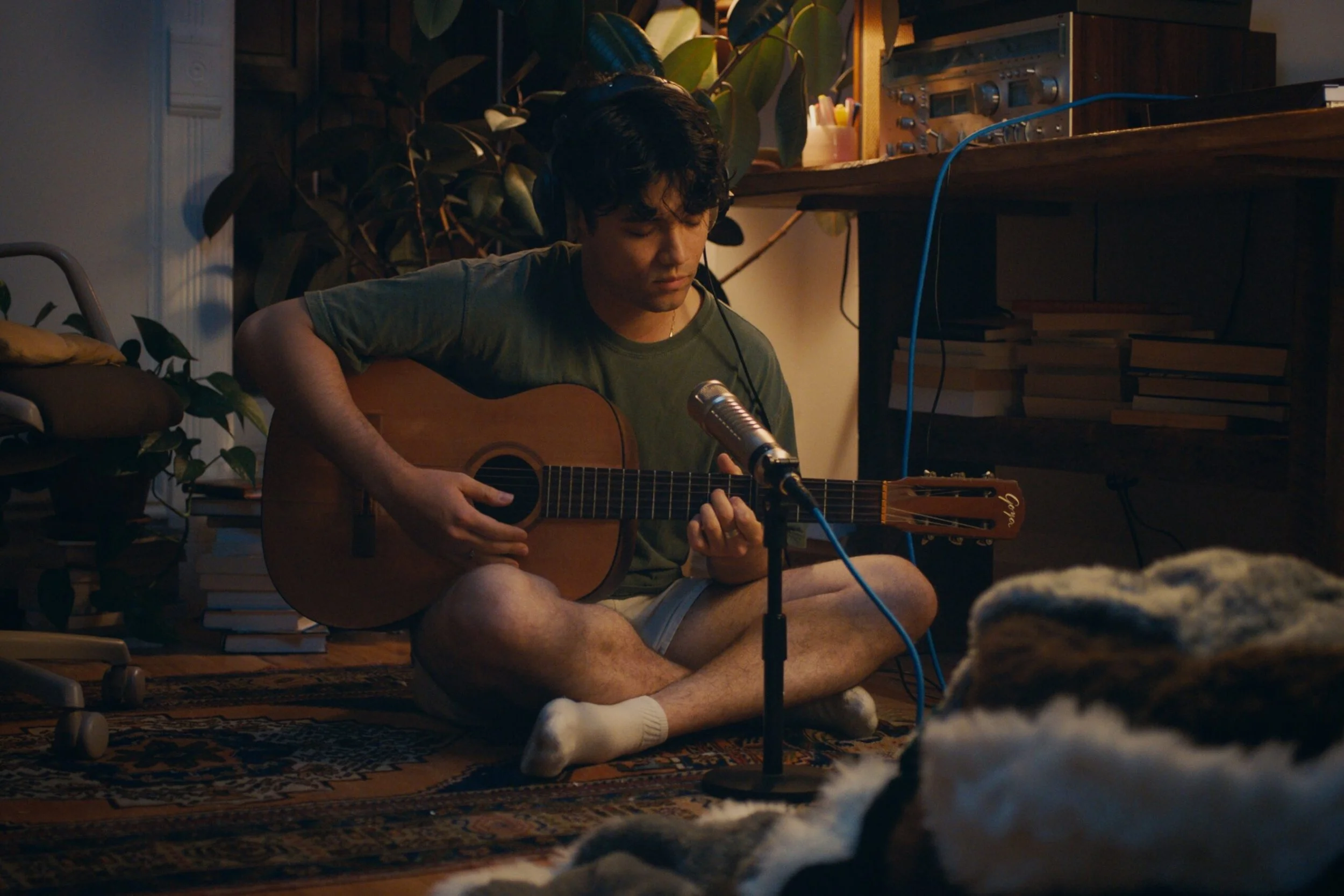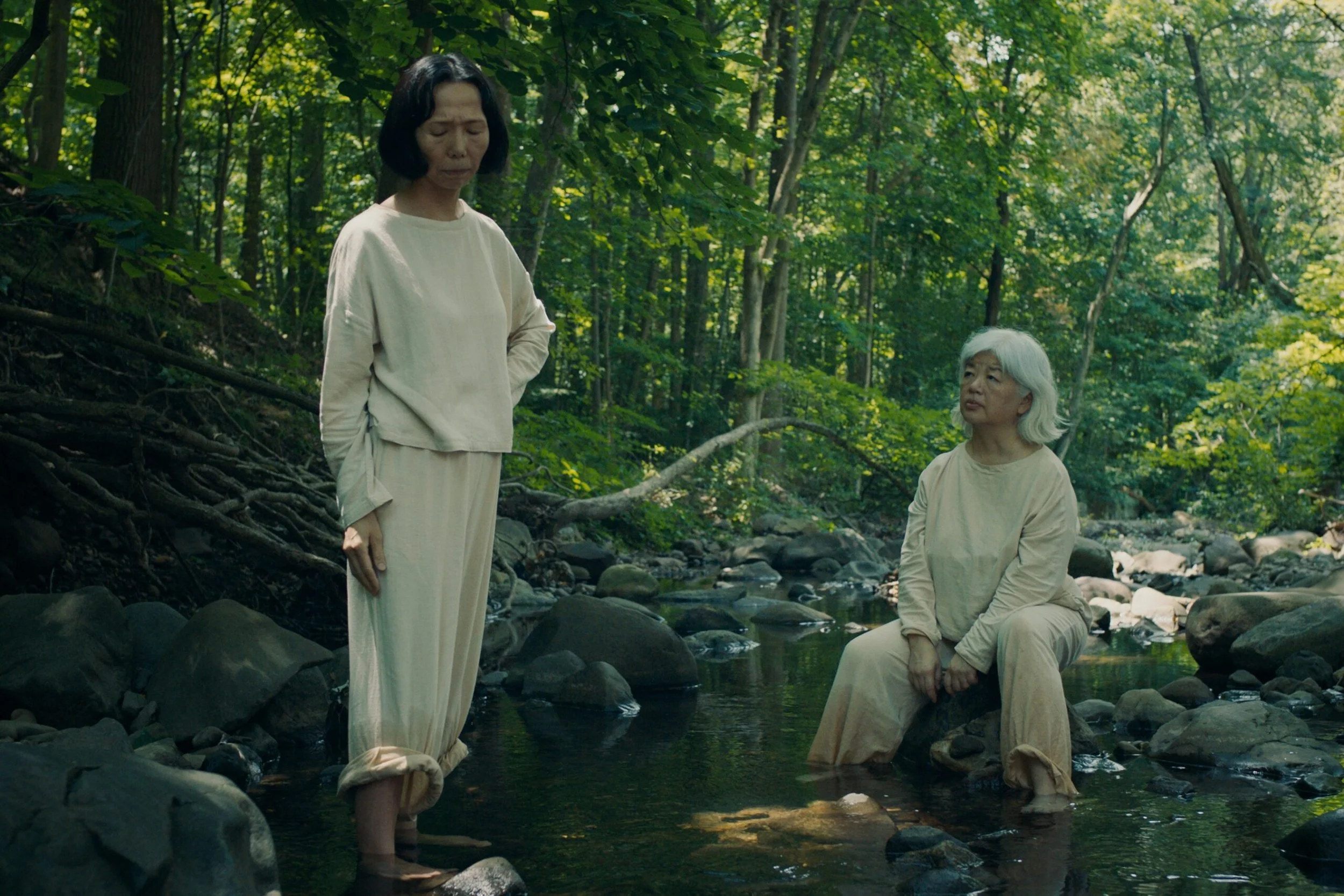Liam Ma’s ‘Song For No One’ Beautifully Places Grief Out in the Open
“I made this film to say all the things that I can’t say.”
Liam Ma. Courtesy photo.
Clocking in at just six minutes and 15 seconds, actor-turned-writer-and-director Liam Ma’s new short film Song For No One delivers a hefty wallop — and message.
The film centres on Gene (Giullian Yao Gioiello), a young Brooklyn man who hosts his own radio show out of his apartment to share his music with anyone out there in the city who might, by chance, connect with it. Someone does, quite deeply, but not in New York City.
Gene’s late mother, Sook-Ja (Felice Choi), listens in while in the afterlife. In fact, she powers her special radio by riding a stationary bike, alongside her interpreter Han Sol (Stella Kim) each day. Listening to her son sing, and the sorrow and passion in his voice, moves her to tears but also keeps her rooted to him.
Ma’s directorial debut is a tribute to his own mother, who died in 2020 from cancer, and who he says shaped him greatly as an artist, as it does Gene. In so many ways, then, while it may be brief and subtle, Song For No One is a profound exploration of grief. Particularly at the hands of an Asian filmmaker; after all, in Asian communities, little is said when it comes to familial grief and love. Connection lives in our actions: the meals we make for each other, how we clean up after one another, why we check in just about all the time.
To craft such a careful and personal tale, Ma worked on the short for a year, initially without plans to make it. It was almost too personal; even the use of stationary bikes to pick up radio waves came from Ma’s time as an engineering student.
“It’s funny, because when I wrote it, I didn’t even recognize it as being as autobiographical as it is,” says Ma, with a sweet and perpetual smile. “There was something unresolved in the grieving process. Grief is so absurd at times, it will hit you in the most unexpected ways, and there’s no timeline. I wrote this when I was still very new to writing, so I sent it to experienced mentors and writers over Christmas, because I thought it would be too busy a time for them to look at it. But they immediately came back with the most wonderful feedback and it blossomed from there.”
“Grief is so absurd at times, it will hit you in the most unexpected ways, and there’s no timeline.”
Originally from Mississauga, Ma is now based in Vancouver. You’re more likely to recognize him from his acting work, including in the similarly, quietly moving independent web series Streams Flow From A River, which earned him a Canadian Screen Award nomination earlier his year. He can next be seen in the highly hyped Cruel Intentions remake and the film Young Werther alongside Patrick J. Adams and Alison Pill.
Giullian Yao Gioiello as Gene in Song for No One. Courtesy photo.
You’d think, then, surely Ma would be void of any anxiety or uncertainty in fronting a project behind the scenes. You’d be wrong. His father, who supported his crowdfunding campaign for the film, has yet to see it and will be right next to him and his brother in the theatre when it premieres at the Reel Asian Film Festival later this week as part of the Unsung Voices program.
“It was really scary. I can’t imagine directing a story like this for someone else,” he says. “There were so many times when I was trying to figure out how to communicate the vision that was in my head. That’s a huge part of being a director; you’re making 50 decisions a minute on something that’s so close to you, and the next minute you’re thinking, ‘Oh, actually I regret that choice. Maybe this was better.’”
“Loss is such a universal experience. You can have the representation of the unspeakability of death, grief and spirituality. I wanted it to be specific and nuanced by my experience, which is obviously coloured by me being Chinese Canadian. But at the same time, I want it to live more broadly.”
As a lifelong (self-professed) people-pleaser, Ma says this was particularly tough. He’d ask crew members for their advice on something as simple as the colour of a wardrobe item, and then realize, still, the choice was his and about his vision.
“The director sets the tone, and I was just so honoured to have the people I had working with me, they were all so wonderful,” says Ma. “Writing is sometimes a very solitary process. But to see actors say words that are yours and make them their own… At the end of the day, I’m proud of what we made, and I feel like it is very me, I feel my humour in it, I feel my sadness in it, I feel all of these things that I didn’t realize before. It would have been a different story if someone else had directed it.”
Even so, Ma says almost with relief, this was very much a collaborative process. He and Gioiello — who Ma says was a “guiding force” on the set —have since become great friends. Call it fate: when they first met to discuss the project, Gioiello jokingly accused Ma of stalking him, since he had grown up running a radio show with his uncle. The two shared countless similar life stories and memories — he couldn’t have understood Ma’s story or sentiment more. Gioiello’s performance of the original music itself drove the sound person to tears while filming.
Felice Choi as Sook-Ja and Stella Kim as Han-Sol in Song for No One. Courtesy photo.
As for Choi and Kim, they were found through the audition process, and their work made for many “beautiful” moments, too. Ma remembers several times when crew members would turn to each other to exchange a look, so moved were they by the women’s performances.
The filmmaker goes on to explain how deeply aware he is of tokenization in the film and television industry. And while yes, of course it’s a special thing to depict Asian grief on screen, it’s also important to remind audiences that our stories are so much more.
For instance, after his mother’s death, Ma saw his father cry and wail for the first time, but felt too “unequipped” to know how to respond. But minutes later, his father wiped his tears away and began talking logistics. As Ma puts it, “In the span of 10 minutes, he’s grieving and then designing a gravestone.”
“Loss is such a universal experience,” says Ma. “But my hope is that this lives on for a very broad audience. You can have the representation of the unspeakability of death, grief and spirituality. I wanted it to be specific and nuanced by my experience, which is obviously coloured by me being Chinese Canadian. But at the same time, I want it to live more broadly.”
While that is only too familiar to many Asian families, the sadness and sorrow is not unique, Ma says, and he’s sure it can reach so many more folks who need it.
“For my dad and my brother, I made this little six-minute film to say all the things that I can’t say, that we didn’t say when we were grieving together, but also kind of were while sitting on the couch watching TV,” he says with a laugh. “I needed to do this to not have the uncomfortable conversations. I hope they will hear all the things unsaid through this film.”
Liam Ma’s ‘Song for No One’ will be screened at the 2024 Reel Asian Film Festival’s Unsung Voices programme on Nov. 16, 2024, 2:30pm at TIFF Lightbox C3. Click here to purchase tickets.



